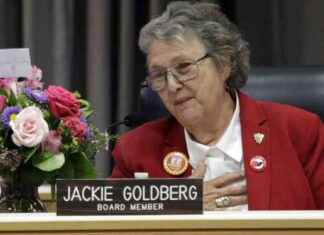This Protestant jurist who entered politics in the early 1970s in the ranks of the unionist Vanguard party, close to the paramilitaries, helped shape, a quarter of a century later, the Good Friday Peace Agreement with the late Catholic John Hume, Nobel co-winner.
David Trimble led the first power-sharing government to emerge from the deal, which ended three decades of bloody clashes between Nationalist Republicans (mostly Catholic), supporters of Irish reunification, and Unionist Loyalists (mostly Protestant), defenders of remaining in the British Crown.
He was a skilled balancing act, as journalist and biographer Andrew Roth described it, “between extreme Protestant bigotry and the moderate center”.
He died on Monday “following a short illness”, his family announced.
– Pure orange juice –
William David Trimble was born on October 15, 1944 to a middle-class family in Bangor, in the east of the British province of Northern Ireland. With a studious temperament, he obtained a law degree in 1968 at Queen’s University in Belfast, where he later taught.
Ironically, this great fan of Elvis Presley posed for a long time as an ardent defender of the hard line against Catholics, contributing to the failure of attempts at peace.
In 1974, he was with those protesting against the Sunningdale Agreement, the first draft of a political settlement of the Northern Irish question. In 1985, he opposed the Anglo-Irish agreement, another failed attempt.
After rubbing shoulders with the extremists of Vanguard, David Trimble joined the Ulster Unionist Party (UPP) in 1978, of which he took the helm in 1995, five years after his first term as a member of the British Parliament in London.
The election as head of the UPP of this eminent member of the Order of Orange, the most powerful Protestant brotherhood in the province, thanks to a very strong program, seems to make any negotiation with the opposing party impossible. .
“Trimble was perceived by nationalists as (…) a bad-tempered and irascible Unionist, with a typical hardline mentality”, underlined in 1999 the British daily The Guardian.
But Trimble thwarted the odds, cautiously heading to the negotiating table, with unsuspected pragmatism and political acumen.
In the autumn of 1997, after the ceasefire of the Irish Republican Army (IRA), he became the first Unionist official to start a dialogue with the Republicans of Sinn Fein, the political branch of the IRA – even if his leader Gerry Adams is “the most appalling human being (he’s) ever met”.
Once the peace agreement was signed, after months of intense discussions, he spared no effort to convince the Unionists who were crying treason to accept the historic compromise.
Three years after marching hand in hand with fundamentalist Ian Paisley during an Orange march, David Trimble shakes hands with Irish singer Bono (U2) and John Hume during a peace concert in Belfast that will help to the victory of the “yes” vote in the referendum on the Good Friday agreement.
But peace is not a long calm river and the sharing of power proves difficult.
The issue of disarming the IRA – effective in 2005 – resulted in the suspension of regional institutions on four occasions, until their complete suspension in October 2002 for five years after allegations of espionage targeting members of Sinn Fein.
In 2005, David Trimble suffered a crushing defeat in the British legislative elections. He then joined the Conservative Party and the House of Lords.
In 2019, this Brexit supporter and father of four children admitted to the upper house that he had reconsidered his opposition to same-sex marriage after the union of his eldest daughter with his partner, a new sign of his pragmatism in the face of the evolution of history.






